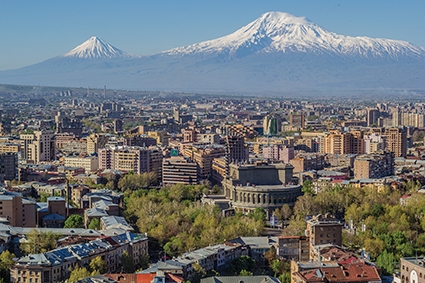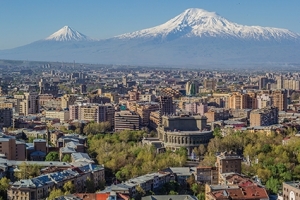Keeping the Neighborly Train Rolling: Yerevan
Op-Ed
Interesting processes have been developing in our geographical neighborhood, while Georgian politics is busy with the Ukrainian “Blitzkrieg” of the third president of Georgia. After the first train passed on the Baku-Tbilisi-Kars rail link, and the Foreign Affairs ministers from Azerbaijan, Georgia and Turkey agreed on the mutual three-year action plan, the Kremlin was quick to start the discussions about political isolation of our neighboring county, Armenia.
Armenian media published articles where authors argue that plans agreed on at the meeting of ministers in Baku are critically against Armenian interests; some in Yerevan are positive that the alliance signed in Baku, which also carries a military component together with economic, is directed towards isolating Armenia and ‘torpedoing’ Georgian-Armenian friendship. “One of the goals of cooperation of Azerbaijan and Turkey with Georgia is torpedoing Armenian-Georgian relationships,” wrote the Armenian publication Lragir.
Last week’s meeting in Baku was preceded with a Batumi ministerial held in May, where the Georgia-Turkey-Azerbaijani military partnership memorandum was signed. Announcements about the alleged new coalition were actively made at the time. Armenian media was especially irritated about the part of the mutual announcement where the discussion referred to peaceful resolution of conflicts in Abkhazia, South Ossetia and Nagorno-Karabakh within the territorial integrity. This issue was once again raised by the parties this time in Baku, and was perceived as an ominous signal in Yerevan. Apart from the Karabakh factor, Armenian media and political circles actively discussed the fact that the Turkish-Georgia-Azerbaijani alliance directly opposes the Russia-Armenia-Iran coalition and that these processes will place Armenia into isolation. Official Yerevan prefers to keep silent for the moment, however, we all clearly remember the position that the Armenian delegation stuck to during the voting in the UN, where the issue of returning Abkhazian and South Ossetia IDPs was discussed. Armenia was the one among those 14 countries who did not support the return of Georgian IDPs. Notably, the voting in the UN took place in May, after the Batumi ministerial.
Armenian-Georgian relations are an issue of concern in Yerevan, and nowhere can this be more clearly felt than in the article published by Akop Badalyani in Lragir. The author believes that Baku and Ankara are attempting to instigate opinion that Armenia is supporting Russia in preparation of the alleged blow against Georgia, which “lacks logical grounds”. “On the contrary, Russia believes that closer Georgian-Armenian relations are a challenge and tries to support this process. But the problem is Georgia’s Euro Atlantic orientation, which makes Tbilisi a convenient platzdarm for NATO’s military blockage in the Caucasus,” writes Badalyan.
Well, honestly, are our neighbors to be blamed for the fact that the Kremlin is irritated by the number of NATO military trainings in Georgia? NATO invites Official Yerevan to its circles, but our Armenian neighbors are categorically against it and prefer a military alliance with the Kremlin. Simple logic suggests that Armenia is the one responsible for its own isolation and Turkey, Azerbaijan and especially Georgia have nothing to do with it.
Georgian political analysts also responded to the debates around Armenian isolation raised in the Armenian media. They believe that the current situation is a logical development of a process which started long ago between Turkey, Azerbaijan and Georgia. Brigadier General Amiran Salukvadze told newspaper Resonansi that Georgia has its own policies which are certainly not against our neighbors: “We should react calmly to the analytical publications and I call on the government to activate all kinds of informational relationships, to issue explanations about its activities, so that these will not be perceived as threats,” he said, also suggesting that “political analysts also hold certain responsibility for their statements!”
The meeting that was held in Baku is very far from the creation of a new military alliance. The irritation of Official Yerevan, as well as the campaign raised in the media, might be connected to economic alliances rather than political. The former has already been demonstrated on the Baku-Tbilisi–Kars rail link: the train is already on the move, this is a fact, and nothing can stop the train from moving on its way.
Zaza Jgarkava












